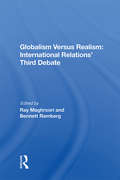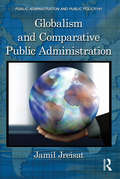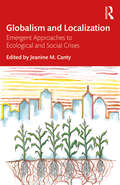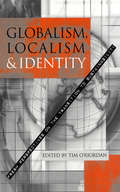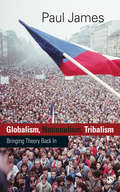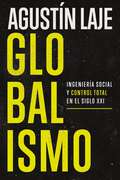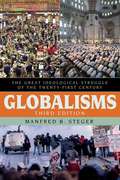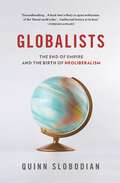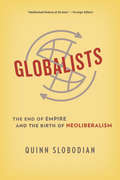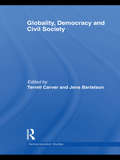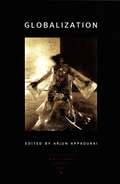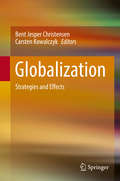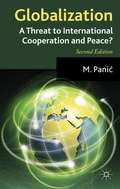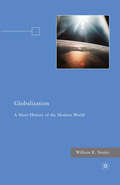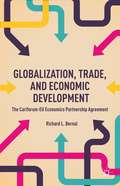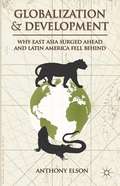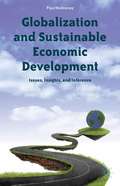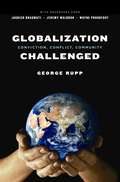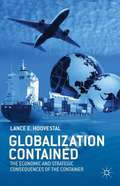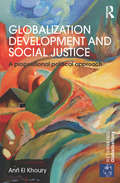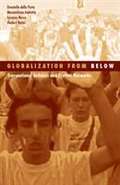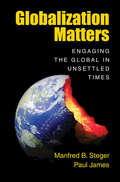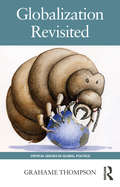- Table View
- List View
Globalism Versus Realism: International Relations' Third Debate
by Bennett Ramberg Ray MaghrooriSince World War I, when the movement toward a comprehensive and systematic examination of international relations began, two intensive debates about the nature and methodology of the discipline have helped shape the field. The first was between the realist and the idealist schools; the second, between the traditionalists and the behavioralists. Now, a third debate has emerged, pitting state-centric conceptualizations against the globalist focus on interdependence. At issue is the nature of the international system. Is it still one in which the sovereign nation-state constitutes the dominant actor? Or has a process of global political, economic, and even social integration transformed the world into a "global village"? This text presents seminal works that define and illuminate the third debate, focused by the editors' comments prefacing each chapter and their synthesizing introductory and concluding chapters. It is designed to allow students and scholars to compare and contrast the contending approaches in order to better understand and develop the discipline of international relations. Given the consensus among both realists and globalists that our assumptions about world affairs affect how we construct theories to explain events and that the model we impose on the world directly affects the policies we prescribe, it is difficult to overemphasize the importance of the subject.
Globalism and Comparative Public Administration (Public Administration and Public Policy #161)
by Jamil JreisatGlobalization, rapidly evolving communication and information technology, and the spread of democracy across the world are reshaping public organizations and changing governance. Yet, graduate students and public administration academics have limited resources with which to develop a real-world understanding of the conceptual evolution and the changing contextual relationships in the field. Helping to fill this void, Globalism and Comparative Public Administration examines comparative public administration from the 1960s to the present—providing an integrated and realistic view of the comparative perspective and its rationale. It explores the development and contributions of the comparative approach and explains how it is essential for developing the depth and breadth needed to transform public administration to a global field of learning and practice. Building on the success of the 2002 edition, the book covers new topics and offers expanded discussions on globalism, governance, and global ethics. From classic models to novel concepts and practices, this volume provides an exhaustive view of the development of the comparative perspective and its contributions of practical administrative knowledge that are applicable beyond national boundaries.
Globalism and Localization: Emergent Solutions to Ecological and Social Crises
by Jeanine M. CantyConsidering the context of the present ecological and social crisis, this book takes an interdisciplinary approach to explore the relationship between globalism and localization. Globalism may be viewed as a positive emergent property of globalization. The latter depicts a worldwide economic and political system, and arguably a worldview, that has directly increased planetary levels of injustice, poverty, militarism, violence, and ecological destruction. In contrast, globalism represents interconnected systems of exchange and resourcefulness through increased communications across innumerable global diversities. In an economic, cultural, and political framework, localization centers on small-scale communities placed within the immediate bioregion, providing intimacy between the means of production and consumption, as well as long-term security and resilience. There is an increasing movement towards localization in order to counteract the destruction wreaked by globalization, yet our world is deeply and integrally immersed within a globalized reality. Within this collection, contributors expound upon the connection between local and global phenomenon within their respective fields including social ecology, climate justice, ecopsychology, big history, peace ecology, social justice, community resilience, indigenous rights, permaculture, food justice, liberatory politics, and both transformative and transpersonal studies.
Globalism, Localism and Identity: New Perspectives on the Transition of Sustainability
by Tim O'RiordanGlobal economic and social forces are affecting everyone, everywhere. However, their influence is shaped by local communities' interpretation of these forces and responses to them. Social identities provide a guide; they are the product of history, culture, economy, patterns of governance and degree of community cohesion. How the global and the local connect and reconfigure at various scales and through different cultures is explained in this forward-looking volume. The book's thesis, namely that localism is the crucial complement to globalism, is supported by a range of European case studies. Local responses to globalizing forces depend on the nature of the interlinkages in governance from international structures, through multilateral organizations to nation states, regions and localities, as these are mediated through social-local identity. The contributors draw on numerous themes in examining the interaction between the global and the local, such as decay and revitalization, local identity and empowerment, opportunism through sustainability and governance for the transition. This is a pioneering publication utilizing an innovative person-centred methodology. It makes an original and important contribution to the study of contemporary societies and is aimed at anyone interested in the social, economic, political, cultural and environmental implications of any move towards sustainability.
Globalism, Nationalism, Tribalism: Bringing Theory Back in (Towards A Theory Of Abstract Community Ser. #Vol. 2)
by Paul W James`Paul James has written a magnificent account of the world′s current condition, one that highlights the complexities and contradictions with which people, communities, and nations must contend and that does so in a compelling and creative style. Stressing the interaction between global and local forces, his writing style is lively and compelling as well as peppered with a wide range of citations, from Woman′s Day to the Cambodian Daily (on the same page!)′ - James N Rosenau, University Professor of International Affairs, The George Washington University Globalism, Nationalism, Tribalism establishes a new basis for understanding the changing nature of polity and community and offers unprecedented attention to these dominant trends. Paul James charts the contradictions and tensions we all encounter in an era of increasing globalization, from genocide and terrorism to television and finance capital. Globalism is treated as an uneven and layered process of spatial expansion, not simply one of disorder, fragmentation or rupture. Nor is it simply a force of homogenization. Nationalism is taken seriously as a continuing and important formation of contemporary identity and politics. James rewrites the modernism theories of the nation-state without devolving into the postmodernist assertion that all is invention or surface gloss. Tribalism is given the attention it has long warranted and is analyzed as a continuing and changing formation of social life, from the villages of Rwanda to the cities of the West. Theoretically adept and powerfully argued, this is the first comprehensive analysis that brings these crucial themes of contemporary life together.
Globalismo: Ingeniería social y control total en el siglo XXI
by Agustin LajeDesvela los mecanismos ocultos de la dominación mundial con Globalismo: Ingeniería social y control total en el siglo XXI. El exitoso autor Agustín Laje desentraña magistralmente la malvada realidad de nuestro mundo moderno e ilumina las tinieblas de las fuerzas de poder que tratan de controlar a la humanidad. El globalismo no es globalización, sino una demoledora ideología que supone el más ambicioso proyecto de ingeniería social y control total en curso. Institucionalizada en organizaciones que, por definición, no tienen ni patria, ni territorio ni pueblo, esta ideología pretende parir un régimen político antidemocrático de alcance global. Así la soberanía de las naciones se redistribuye entre organizaciones supranacionales como el Foro Económico Mundial o la ONU con su Agenda 2030, liberadas de las limitaciones de los intereses particulares de los pueblos, para coordinar las transformaciones necesarias para nuestra «supervivencia». El globalismo también propone nuevas formas de legitimidad basadas en la tecnocracia y la supuesta filantropía de organizaciones como la Fundación Gates, la Open Society de Soros, y la Fundación Rockefeller.En esta obra, Agustín Laje explica magistralmente el origen y la formación del contrato social de nuestros Estados nacionales sobre una base democrática, mostrando cómo el globalismo busca culpabilizar estas estructuras para llevarnos a un callejón sin salida, donde todo se cede a una gobernanza global no representativa, la máxima expresión de la oligarquía de unos pocos privilegiados a los que nadie votó, y que ante nadie rinden cuentas pero que pretenden dirigir el destino del planeta.El autor llama a todos los actores sociales, políticos, religiosos e intelectuales a unirse contra el globalismo. La paradoja de que los patriotas olviden sus fronteras para esta batalla cultural adquiere un nuevo significado. Conocer la verdad y denunciar la mentira es un arma valiosa que este libro ofrece.GlobalismUncover the secret workings of world domination with Globalism: Social Engineering and Total Control in the 21st Century. Best-selling author Agustín Laje masterfully unravels the sinister reality of our modern world and sheds light on the darkness of the forces of power that seek to control humanity.Globalism is not globalization, but rather a devastating ideology representing the most ambitious social engineering and total-control project currently underway.Institutionalized by organizations such as the World Economic Forum or the UN with its Agenda 2030, Globalism also promotes new forms of legitimacy based on &“technocracy&” and the supposed philanthropy of organizations such as the Gates Foundation, Soros&’ Open Society, and the Rockefeller Foundation.In this book, Agustín Laje skillfully explains the origin and formation of the social contract of our nation-States based on democracy, demonstrating how globalism seeks to blame these structures in order to steer us into a dead-end, where everything is handed over to a non-representative global governance. This represents the ultimate expression of an oligarchy formed by a few privileged elites who were elected by no one and are accountable to nobody, yet aim to dictate the destiny of the planet.The author calls on all social, political, religious, and intellectual figures to unite against globalism. The paradox of patriots disregarding their borders for this cultural battle takes on a new significance. Knowing the truth and denouncing the lie is a valuable weapon that this book offers.
Globalisms: The Great Ideological Struggle of the Twenty-first Century (3rd Edition)
by Manfred B. StegerThis new edition of Manfred Steger's award-winning book explores the three principal ideologies of our time: the dominant "market globalism" based on a neoliberal vision of the world as a single marketplace, the "justice globalism" developed over the last decade by a transnational coalition of global civil society forces, and the "jihadist globalism" of radical Islamists seeking to galvanize their global community of believers into violent action. Market globalism has responded to these challengers by turning into "imperial globalism"-a political belief system that marries the capitalist language of the 1990s with the security concerns of our post-9/11 world. Steger, one of the world's leading scholars on these subjects, explores globalization's central questions: What, exactly, are the core claims of these conflicting globalisms? How does the imperial globalism of the 2000s differ from the market globalism of the 1990s? How has justice globalism managed to mature into a coherent ideology? What are the most likely future trajectories of this great ideological struggle of the twenty-first century? Written with impressive historical and theoretical breadth, this groundbreaking work is essential reading for all those concerned with the key questions that our shrinking world must face.
Globalists: The End of Empire and the Birth of Neoliberalism
by Quinn SlobodianNeoliberals hate the state. Or do they? In the first intellectual history of neoliberal globalism, Quinn Slobodian follows a group of thinkers from the ashes of the Habsburg Empire to the creation of the World Trade Organization to show that neoliberalism emerged less to shrink government and abolish regulations than to redeploy them at a global level. Slobodian begins in Austria in the 1920s. Empires were dissolving and nationalism, socialism, and democratic self-determination threatened the stability of the global capitalist system. In response, Austrian intellectuals called for a new way of organizing the world. But they and their successors in academia and government, from such famous economists as Friedrich Hayek and Ludwig von Mises to influential but lesser-known figures such as Wilhelm Röpke and Michael Heilperin, did not propose a regime of laissez-faire. Rather they used states and global institutions—the League of Nations, the European Court of Justice, the World Trade Organization, and international investment law—to insulate the markets against sovereign states, political change, and turbulent democratic demands for greater equality and social justice. Far from discarding the regulatory state, neoliberals wanted to harness it to their grand project of protecting capitalism on a global scale. It was a project, Slobodian shows, that changed the world, but that was also undermined time and again by the inequality, relentless change, and social injustice that accompanied it.
Globalists: The End of Empire and the Birth of Neoliberalism
by Quinn SlobodianDo neoliberals hate the state? In the first intellectual history of neoliberal globalism, Quinn Slobodian follows neoliberal thinkers from the Habsburg Empire’s fall to the creation of the World Trade Organization to show that neoliberalism emerged less to shrink government and abolish regulations than to deploy them globally to protect capitalism.
Globality, Democracy and Civil Society (Democratization Studies)
by Terrell CarverGlobality, Democracy and Civil Society explores the relationship between the concepts of democracy and civil society through a comparison of their meaning and function in different historical and cultural contexts. This volume presents detailed contextual studies in Europe, North America, Japan, Russia and Turkey. The contributors explore different ways of understanding and developing democratic practices and institutions. Rather than projecting the conditions of modern representative, state-centric democracy onto the global realm, they propose ways of rethinking these very conditions in terms of human diversity and difference. This is done by exploring conceptions of democracy that reconcile cultural plurality with democratic practices, and by using a number of examples and perspectives framed by a global context, rather than by geographical divides between East and West. The contributors are not trying to define the concept of civil society, but rather demonstrating the different ways it is deployed in political practice and disseminated through on-going processes of globalisation. This book will be of interest to scholars and students of global democracy and governance, cosmopolitan democracy, the future of civil society in a globalising world, comparative politics and political thought.
Globalization
by Arjun AppaduraiEdited by one of the most prominent scholars in the field and including a distinguished group of contributors, this collection of essays makes a striking intervention in the increasingly heated debates surrounding the cultural dimensions of globalization. While including discussions about what globalization is and whether it is a meaningful term, the volume focuses in particular on the way that changing sites--local, regional, diasporic--are the scenes of emergent forms of sovereignty in which matters of style, sensibility, and ethos articulate new legalities and new kinds of violence. Seeking an alternative to the dead-end debate between those who see globalization as a phenomenon wholly without precedent and those who see it simply as modernization, imperialism, or global capitalism with a new face, the contributors seek to illuminate how space and time are transforming each other in special ways in the present era. They examine how this complex transformation involves changes in the situation of the nation, the state, and the city. While exploring distinct regions--China, Africa, South America, Europe--and representing different disciplines and genres--anthropology, literature, political science, sociology, music, cinema, photography--the contributors are concerned with both the political economy of location and the locations in which political economies are produced and transformed. A special strength of the collection is its concern with emergent styles of subjectivity, citizenship, and mobilization and with the transformations of state power through which market rationalities are distributed and embodied locally. Contributors. Arjun Appadurai, Jean Franois Bayart, Jrme Bind, Nstor Garca Canclini, Leo Ching, Steven Feld, Ralf D. Hotchkiss, Wu Hung, Andreas Huyssen, Boubacar Tour Mandmory, Achille Mbembe, Philipe Rekacewicz, Saskia Sassen, Fatu Kande Senghor, Seteney Shami, Anna Tsing, Zhang Zhen
Globalization
by Bent Jesper Christensen Carsten KowalczykThis volume uses cutting-edge theory and empirical analysis of channels of international interaction to build new knowledge about strategies of entrepreneurs, domestic and multinational firms, governments, and international organizations facing increasing globalization. The ongoing process of globalization implies the continuing expansion and intensification of economic, political, social, cultural and judicial relations across borders. It is furthered by reductions in transportation and communication costs, the rise of new information technologies, such as the internet, and liberalizations in the markets for goods, services, labor, capital, and technology. Globalization presents new opportunities to some, but risks and threats to others. The volume presents new research and findings by leading scholars on international trade, labor markets, financial markets, economic integration, political science, law, management, the humanities, developing countries, and international relations.
Globalization
by M. PanicGlobalization and National Economic Welfare makes an original, powerful and timely contribution to a highly topical issue that affects all countries by showing why globalization is unsustainable in the long term without fundamental changes in existing attitudes and institutions. The book analyzes one of the most important aspects of economic policy at the beginning of the twenty-first century: how to overcome the growing threat that inequalities created by globalization pose to economic progress and political stability both nationally and internationally. Economic problems, from corporate fraud and bankruptcies to the high social costs of the adjustments that globalization imposes on individual countries, are becoming increasingly international and, consequently, demand action at the supranational level. Yet the effective institutional framework for dealing with these problems remains national. In contrast to the neo-liberal approach, the author argues that the state, as the only form of organization that has the power to reconcile conflicts of interest nationally and internationally, has a critical role to play in ensuring that globalization does not end in failure and war.
Globalization
by William R. NesterHow did globalization come to dominate our lives? What have been, are, and most likely will be globalization's potential benefits and costs? This book explores the world's most powerful force for good and evil from the Renaissance through today and beyond.
Globalization , Trade , And Economic Development
by Richard L. BernalThis is the most in-depth study of the economic partnership between the European Union and the CARIFORUM countries, a group of fifteen small developing economies in the Caribbean. The CARIFORUM-EU Economic Partnership Agreement (EPA) is the first trade agreement of its kind, as it is a new type of WTO-compatible trade agreement between a group of developed countries and a group of developing countries. As a principal negotiator for CARIFORUM, Bernal's qualifications allow him to provide a unique perspective on the increasingly important topic of trade and economic development in the midst of globalization. Globalization, Trade, and Economic Development comprehensively explores the components of the EPA from all angles, explains how the agreement provides opportunities to strengthen and accelerate economic development, and outlines the policies which can allow the CARIFORUM countries to seize these opportunities. Bernal's explanation of the institutional arrangements for the conduct of the negotiations by CARIFORUM is invaluable to governments and regional organizations in developing countries for coordinating groups to advance common and joint positions in international negotiations.
Globalization And Development
by Anthony ElsonWhy has there been such a pronounced divergence in the economic fortunes of developing countries? Comparing the experiences of East Asia and Latin America since the mid-1970s, Elson identifies the key internal factors common to each region which have allowed East Asia to take advantage of the trade, financial, and technological impact of a more globalized economy to support its development, while Latin America has not. Unique in its comparative regional perspective and grounded in an inter-disciplinary approach, this work is a timely addition to our understanding of the future of economic development.
Globalization And Sustainable Economic Development
by Piya MahtaneyIn a world in transition and an era of transformation, Mahtaney calls for reflection and an analysis of a wide canvas of global economic experience. Her new work initiates a thorough review of the strategies and policies that have been pursued over the past two decades. The economic meltdown compelled the beginning of the next phase of globalization and she contends that the future will see an increase in globalization. As crucial questions arise about the direction in which globalization is headed and the sustainability of economic growth and reform, the fundamental objective of this exciting work is to elucidate crucial insights about the next phase of development in the world economy.
Globalization Challenged: Conviction, Conflict, Community
by Wayne Proudfoot George Jeremy Waldron Rupp responses by Jagdish BhagwatiThe president of the International Rescue Committee calls for commitment that will build community from the ruins of conflict.
Globalization Challenged: Conviction, Conflict, Community (Leonard Hastings Schoff Lectures)
by George RuppIn Globalization Challenged, George Rupp, president of the International Rescue Committee, outlines the steps necessary to engage the contemporary conflict between traditional religious belief and Western secularism. According to Rupp, the key objective is to build a community that is inclusive without denying the validity of particular commitments. While he acknowledges the threat of "resurgent fundamentalism," Rupp also criticizes secularists who fail to recognize or acknowledge the role of religion and its ideological equivalents in influencing public policy. All views, he asserts, are subject to comparative appraisal. The challenge is to develop ways to evaluate different approaches responsibly, leading to a greater understanding of one's own convictions as well as the positions of others.Rupp reinforces his critical and theoretical analysis with dramatic accounts of recent events in Afghanistan, the Democratic Republic of Congo, and Sudan—places where the International Rescue Committee operates. He then addresses the role of globalization in fueling instability worldwide. Inadequately regulated privatization has compromised health care, education, and social programs in many countries, whereas an inclusive community would encourage a more equitable distribution of resources.Essays by Jagdish Bhagwati, Jeremy Waldron, and Wayne Proudfoot expand Rupp's arguments, and in a final chapter Rupp responds to the issues they raise. Essential reading for anyone who hopes to understand the roots of today's geopolitical tensions, Globalization Challenged asks that we shed our complacency, recognize the legitimate role of conviction, and take actions to shape a more just and inclusive society.
Globalization Contained
by Lance E. HoovestalExamining the global significance of the freight container, with particular emphasis on the perspectives of the US and China, Globalization Contained considers the implications of the freight container as an agent of change for the future of the global economy and global security.
Globalization Development and Social Justice: A propositional political approach (Rethinking Globalizations)
by Ann El KhouryAre there existing alternatives to corporate globalization? What are the prospects for and commonalities between communities and movements such as Occupy, the World Social Forum and alternative economies? Globalization Development and Social Justice advances the proposition that another globalization is not only possible, but already exists. It demonstrates that there are multiple pathways towards development with social justice and argues that enabling propositional agency, rather than oppositional agency such as resistance, is a more effective alternative to neoliberal globalization. El Khoury develops a theory of infraglobalization that emphasizes creative constitution, not just contestation, of global and local processes. The book features case studies and examples of diverse economic practice and innovative emergent political forms from the Global South and North. These case studies are located in the informal social economy and community development, as well as everyday practices, from prefigurative politics to community cooperatives and participatory planning. This book makes an important contribution to debates about the prospects for, and practices of, a transformative grassroots globalization, and to critical debates about globalization and development strategies. It will be of interest to students and scholars of international relations, globalization, social movement studies, political and economic geography, sociology, anthropology and development studies.
Globalization Drives Strategic Product Switching
by Marialuz Moreno Badia Veerle Slootmaekers Ilke Van BeverenA report from the International Monetary Fund.
Globalization From Below: Transnational Activists And Protest Networks (Social Movements, Protest And Contention Series #82)
by Donatella Della Porta Herbert Reiter Lorenzo Mosca Massimillano AndrettaThis volume is the result of a long-lasting collaboration that has already produced two other books on the "new global" movements, in particular on the anti-G8 demonstrations in Genoa in 2001: Global, Noglobal, New Global m Italian (Andretta et al. 2002) and Global No Global in German (Andretta et al. 2003). We are grateful to those who helped us produce those two books. Although some of the ideas developed in those previous works are reported in this volume, here we analyze a new set of data on the first European Social Forum in 2002.
Globalization Matters: Engaging the Global in Unsettled Times
by Manfred B. Steger Paul JamesAt the turn of the twenty-first century, globalization - both the process and the idea - bestrode the world. Widely acclaimed by political and economic pundits as the most important phenomenon of our time, it took the world by storm. Two decades later, it has come under sustained attack by the re-invigorated forces of the extreme right and radical left. Does globalization still matter in our unsettled world? Responding in the affirmative, this study develops and applies a new framework of an 'engaged theory of globalization' to analyze some of today's most pressing global challenges: the rise of national populism, ecological degradation, rapid urbanization, new sources of insecurity, and the changing landscape of higher education. Offering a comprehensive appraisal of globalization in our unsettled times, the authors explain why and how transplanetary interrelations continue to matter in a world that is wavering between globalist expansion and nationalist retrenchment.
Globalization Revisited (Critical Issues in Global Politics)
by Grahame ThompsonWritten by one of the leading scholars of global politics, Globalization Revisited is a major new book for students of globalization. It describes and explains the challenges to liberalism and the global order as result of globalizing forces - from financial interconnectedness to the growth of religious fundamentalisms. The text: provides a detailed analysis of the economic and financial aspects of globalization; examines the changes to global power and governance created by globalization including its effect on the sovereignty of the nation state; discusses recent trends such as the increased use of networks and social media; assesses the rise of globalizing fundamentalism; analyzes the challenges to globalization posed by contemporary events such as the global financial crisis. This book will be essential reading for all students of globalization, and will be of great interest to students of global politics and global governance.
